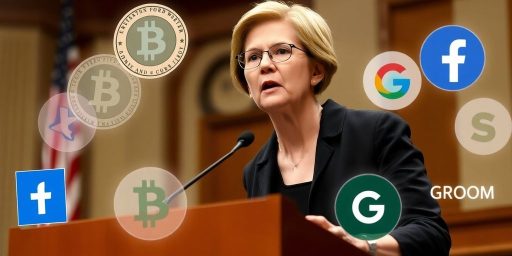Tech giant Meta is reportedly considering a return to the stablecoin market, prompting U.S. Senator Elizabeth Warren to advocate for stricter regulations to prevent large corporations from issuing their own digital currencies. This move comes as the Senate debates the GENIUS Act, aimed at establishing rules for stablecoins.
Key Takeaways
- Senator Warren calls for amendments to the GENIUS Act to block Big Tech from entering the stablecoin market.
- Meta’s previous attempt to launch a stablecoin faced significant regulatory backlash.
- The GENIUS Act is currently stalled in the Senate amid concerns from lawmakers.
- Warren also scrutinizes Binance’s dealings with the U.S. Treasury regarding compliance issues.
Meta’s Interest in Stablecoins
Meta, the parent company of Facebook, has been exploring the possibility of re-entering the stablecoin market after its previous attempt with Libra (later renamed Diem) faced intense scrutiny from regulators. Senator Warren expressed her concerns about Meta’s potential return, emphasizing that the Senate must ensure that large corporations do not gain control over digital currencies that could impact financial transactions for everyday Americans.
Warren stated, "The Senate must fix the GENIUS Act so it prohibits Big Tech companies and other commercial giants from owning or affiliating with stablecoin companies." She believes that allowing such companies to issue their own currencies could lead to significant risks for consumers and small businesses.
The GENIUS Act and Its Challenges
The GENIUS Act, which aims to create a regulatory framework for stablecoins like Tether’s USDT and Circle’s USDC, was initially progressing smoothly through the Senate. However, recent opposition from some Democrats has stalled its advancement. Lawmakers are now negotiating amendments to address concerns about the influence of large tech companies in the financial sector.
Warren’s call for changes reflects a broader apprehension among lawmakers about the implications of Big Tech’s involvement in digital currencies. She has urged her colleagues to consider the potential consequences of allowing these companies to control financial transactions, which could undermine competition and consumer protection.
Binance Under Scrutiny
In addition to her focus on stablecoins, Senator Warren has been actively questioning the U.S. Treasury’s interactions with Binance, a major cryptocurrency exchange. Along with several Democratic senators, she has raised concerns about Binance’s compliance with U.S. laws following a settlement in 2023 regarding various legal issues, including money laundering and sanctions violations.
The senators sent a letter to Treasury Secretary Scott Bessent and Attorney General Pam Bondi, expressing their worries about Binance’s attempts to negotiate reduced oversight as it seeks to strengthen its business ties in the U.S. They noted that Binance’s past admissions of prioritizing growth over compliance raise significant red flags about its operations.
Conclusion
As the debate over the GENIUS Act continues, the future of stablecoins and the role of Big Tech in the financial landscape remain uncertain. Senator Warren’s push for stricter regulations highlights the ongoing tension between innovation in the cryptocurrency space and the need for consumer protection and regulatory oversight. With Meta’s renewed interest in stablecoins and the scrutiny of Binance, the coming weeks will be crucial in shaping the regulatory framework for digital currencies in the United States.








